Self-care: achieving accessibility safely. An interview with Zephanie Jordan
 insights from industryZephanie JordanVice President Global Regulatory Affairs,
insights from industryZephanie JordanVice President Global Regulatory Affairs,
Reckitt Benckiser
Interview conducted by April Cashin-Garbutt, MA (Cantab)
How is ‘self-care’ defined and what are its key benefits?
Self-care can be broadly defined to include measures taken by an individual in the pursuit of obtaining or maintaining good health. It ranges from healthy eating and exercise to good hygiene practices to appropriate use of products such as dietary supplements and over-the-counter medicines to accessing health promoting services.
As for the benefits, self-care promotes the engagement and empowerment of people to take part in managing their own health and as that participation increases, so does the knowledge that people can rely on to make the right choices to get and stay healthy.
Think about what we know today about the benefits of giving up smoking, managing our cholesterol levels, the health giving properties of omega-3 fatty acids. People have learned about these conditions and are making choices to optimize their health based on this knowledge.
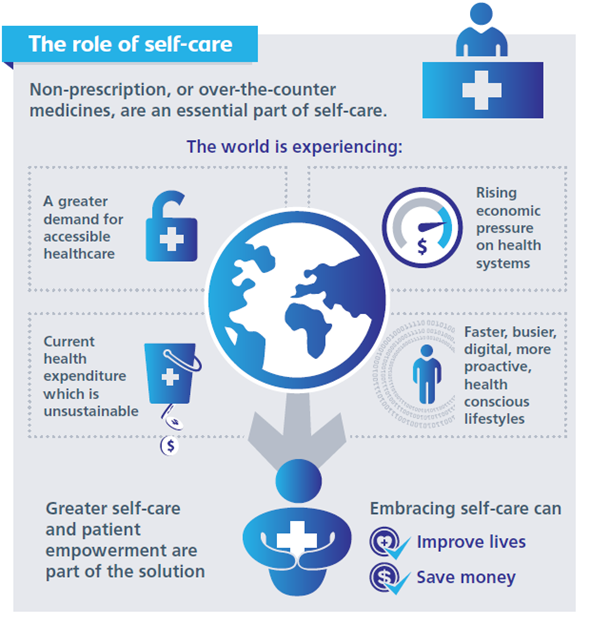
Aside from the direct health benefits, there are economic benefits that can translate into indirect health benefits. What I mean is that is people are engaged in self-care then unnecessary doctor visits can be avoided which in turn takes pressure off already over-burdened health systems and those resources can be redeployed towards the patients who really need them.
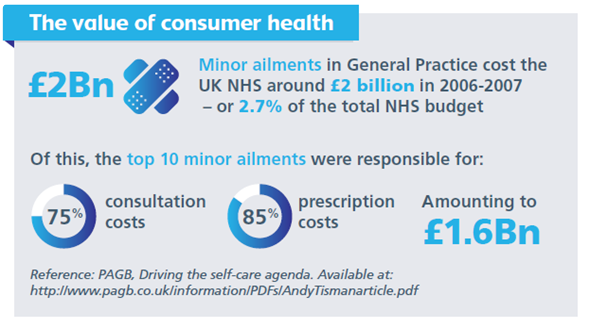
What are the main challenges in promoting self-care whilst protecting people’s safety?
Health literacy is vital and that means people becoming educated about health conditions and how to manage them when it is appropriate for them to do so. Many stakeholders have a role in this.
Healthcare professionals of all disciplines have knowledge to share with people that can help them to feel empowered to make the right choices. Industry has a role in making sure products are labeled in a way that helps to make sure they can be used correctly and providing support and educational resources as well.
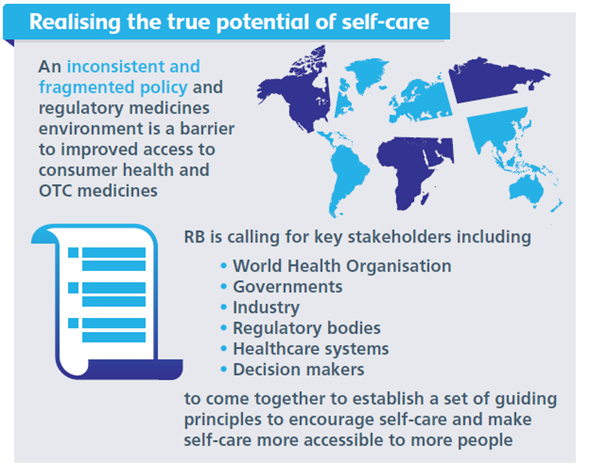
Can you please outline the Economist Intelligence Unit (EIU)’s white paper on consumer health?
RB in association with the Proprietary Association of Great Britain (PAGB) commissioned the Economist Intelligence Unit to investigate the role of self-care and the regulatory barriers that may be impairing access to products that would better enable self-care.
The white paper written by the EIU highlights many of the challenges and barriers resulting from an inconsistent and fragmented policy and regulatory environment which hamper access to products such as over-the-counter medicines used in self-care. We were pleased to see the EIU recommending major steps towards stronger international discussion, cooperation and understanding to facilitate change.
Of particular interest are the findings that over-the-counter (OTC), medicines are an essential part of the most widespread element of healthcare provision: self-care. Patient empowerment and the self-care agenda has come into focus due to increasing and wide-ranging pressures on health systems around the world.
The strain on health resources and budgets is unprecedented and is set to continue given the expanding and ageing population. The value of self-care and self-medication is realized by people managing common minor ailments themselves and as a result, valuable medical resources can be redirected to more serious illness.
The economic impact of improved access to consumer health has been demonstrated by numerous studies which have found that:
- Minor ailments in primary care practice costs the UK NHS around £2bn (US$3.1bn) in 2006-07
- One in five consultations with Primary Care Practitioners (PCPs) and hospital emergency departments could have been handled through self-care in UKi
- In US every dollar spent on OTC drugs led to health system savings of between six and seven dollars
- The shift of care to self-medication in the enlarged European Union by 5% would exceed €16 billion in total annual savings
The report also found that specific role of self-care is not clearly defined and recognition of the role of self-care is highly variable from country to country. For the full potential of self-care to be reached, health and medicines policies need to uniformly recognize the critical role of self-care and then a productive discussion about a tailored system to regulate non-prescription medicines is required.
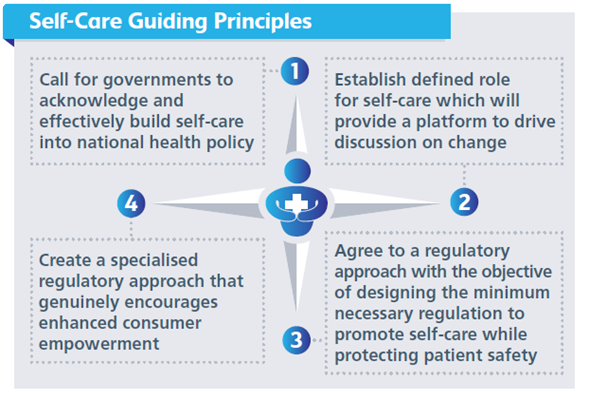
What are your thoughts on the current framework for reviewing over-the-counter (OTC) products?
The simplest answer is to say that the approach to regulating over-the-counter medicines is highly variable from country to country.
Many countries don’t differentiate between a new chemical entity for the treatment of very serious diseases and a commonly used over-the-counter medicine with decades of safe and effective use which means the regulatory approach can be overly burdensome.
The result is that it is often too difficult to bring new and improved over-the-counter medicines to the market so that the opportunity for self-care can be optimized.
There are some countries like the UK, Canada and my home country, Australia, who have at different times struck the right balance by taking a risk based approach to regulation which results in the appropriate level of control and review of products that are safe for people to use.
Sadly the approach isn’t always consistent and different reform efforts result in this balance being lost. Some countries, like the US, go as far as providing incentives for innovation through data or market exclusivity which is a great way to encourage companies to invest in new research for over-the-counter medicines and self-care.
What do you think needs to be done to make self-care more accessible?
Firstly, a recognition at a policy level that self-care is a critical pillar for ensuring population health and sustainable healthcare systems.
Understandably, when Governments talk about access to medicines at a policy level, they are usually talking about access to new treatments for serious diseases and this is vitally important. The case for self-care often gets lost in that conversation.
Industry has an important role to play in obtaining this recognition. I don’t think we’ve done the best job over the years of generating the evidence needed to bring the issue to the surface and I think we have missed opportunities in trade agreement negotiations and the different harmonization efforts to represent what is needed to facilitate self-care.
What safeguards need to be put in place to ensure people’s safety?
Appropriate controls on quality and safety of products and with that as the foundation, information and education is critical and often this comes in the form of labeling supplemented by other sources of information.
Sometimes people think that self-care is about taking the healthcare professional out of the equation but this is not the case. The healthcare professional has a vital role in making recommendations to people and helping with the education on appropriate self-care. Pharmacists and nurses in particular can play an increasingly important role in the management of acute and chronic conditions and in maintaining good health.
How important a role do you think governments should play in implementing self-care policies?
Governments setting the mandate for the role of self-care is essential to be able to trigger the reforms necessary to empower people to engage in self-care. This will come because people are already becoming more engaged tracking their exercise, diet and health statistics.
Everyone has access to health information already and are becoming more educated in managing their own health. Governments are lagging behind in taking advantage of this to accelerate the health of people and reduce the burden on the health system.
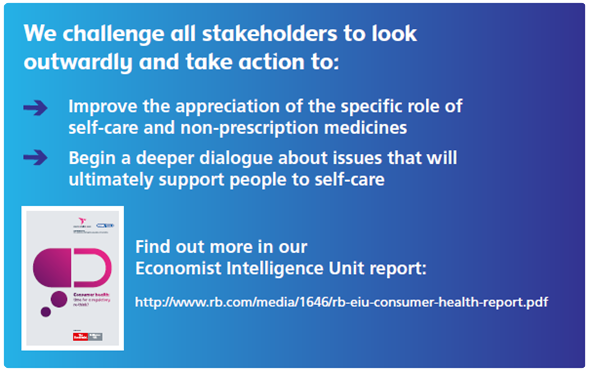
What do you think the future holds for self-care in the UK and globally?
I think the future is unfolding before our eyes with connected devices to track and help control symptoms and diseases, with virtual doctor visits, with people becoming increasingly informed about health conditions. When people start to live to 142 years of age, self-care will be technology enabled and Governments will have had to catch up to facilitate self-care.
Where can readers find more information?
There are a lot of resources actually:
- The Economist report can be found at https://www.eiuperspectives.economist.com/healthcare/consumer-health-time-regulatory-re-think
- The European industry association has just released its 2020 agenda for self-care that can be found here http://www.aesgp.eu/media/cms_page_media/68/AESGP%20Self-Care%20Agenda%202020.pdf
- The UK industry association PAGB manifesto asks the question “Can we afford not to self-care?” http://www.pagb.co.uk/media/pdfs/PAGBManifesto.pdf
- All of these industry association ladder up to the World Self-Medication Industry that is an official observer to the WHO. http://www.wsmi.org
More recently, the International Self-Care Foundation http://isfglobal.org/ has been established which is a charity whose aim it is:
- To promote better health through the benefits of self-care and healthy lifestyles with a particular focus on keeping people healthy.
- To advance the education of the public in preserving and protecting health by the provision of educational support and information on self-care and healthy lifestyles to individuals based on the best available evidence (particularly from the World Health Organization), and deemed best practice.
- To help in the development of health practices and systems, ancillary to those provided by the doctors, focusing on the development of disease prevention services and activities.
PAGB, Driving the self care agenda. Available at: http://www.pagb.co.uk/information/PDFs/AndyTismanarticle.pdf
Booz Co, The Value of OTC Medicine to the United States, January 2012. Available at http://www.yourhealthathand.org/images/uploads/The_Value_of_OTC_Medicine_to_the_United_States_BoozCo.pdf
AESGP. Self-Care: A winning solution for Citizens, healthcare professionals, health systems. 2004
About Zephanie Jordan
Zephanie Jordan is Vice President Global Regulatory Affairs at Reckitt Benckiser. Her career spans 24 years in the consumer health, personal and home care industries.
She started her career in Australia with Procter and Gamble and since then has worked for a number of companies including SmithKline Beecham, Boots Healthcare and Johnson Johnson.
She has also worked for the Australian Self-Medication Industry, which is the Australian equivalent of PAGB, the industry association representing the non-prescription medicines sector.
Zephanie left Australia in 2009 to move to Singapore as the Senior Director, Regulatory and Medical Affairs, Asia Pacific with JJ and then to the US in 2011 to lead Global Regulatory Strategy for JJ and then Global Regulatory Affairs. In 2015 she moved to the UK to re-join RB in her current position.
Zephanie has long been an advocate of consumer centric strategy and product development believing that if the consumer or patient is being served that a sound strategy will follow.
She is an advocate of the critical role that self-care plays in public health both in terms of the social and economic benefits to society through empowerment of consumers in proactively managing their health and at the same time reducing pressures on the unsustainable healthcare systems around the world.
Zephanie holds qualifications in Food Technology, Pharmaceutical Science and Wine Science from Australian universities. She is a mother of two young children who have an Australian/American/English accent and are part of a generation of international children called Third Culture Kids.
